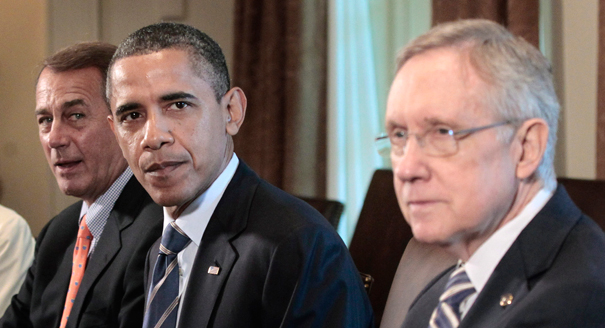Democracy Inaction - the Fiscal Cliff
By
Chris Hellman
Posted:
|
Budget Process
In the wake of the elections, Democrats and Republicans are pledging to work together to solve the fiscal cliff and other daunting challenges that confront the current lame duck session of Congress.
But how likely is that, really? For example, both sides claim that the election was a mandate for their respective position on the expiring Bush-era tax cuts. President Obama is proclaiming broad support for extending tax breaks for the middle class while getting the wealthy to pay more, and House Speaker John Boehner sees validation for the GOP’s position – no raising taxes, period.
Many Washington watchers ask, “what’s changed since the elections?” We have the same Democratically-controlled White House and divided Congress we had before the balloting. Lawmakers have had 15 months since last August’s enactment of the Budget Control Act set the fiscal cliff in motion, and they've accomplished nothing. How has the situation improved?
As my colleague Mattea Kramer and I wrote in a recent piece for “TomDispatch” there are several scenarios that might play out in Washington over the next several weeks. Ideally, our elected officials would compromise on a measured, long-term approach to deficit reduction. More likely is that Congress will again kick major decisions down the road to the next Congress, which begins in January. In other words: no “grand bargain” tying up the fiscal cliff, deficit reduction and economic stimulus.

Left to right: House Speaker John Boehner, President Barack Obama, Senate Majority Leader Harry Reid
And no grand debate of the issues, either. President Obama and congressional leaders of both parties began top-level negotiations last week. If there is a deal, both sides will have to give up something, and if recent past is prologue, rank and file members in both parties will get a “this is what it is” deal presented by the leadership and be asked to sell it to their colleagues and constituents.
Most members of Congress will go along with a package that at least delays the impending cuts to the Pentagon and domestic programs. Certainly lawmakers have had plenty of time to speak on the issues over the past many months and during the elections. But the fact that they may be cut out of the process at the eleventh hour will leave many members fuming. And as far as open, democratic governing goes, this surely won’t be it.